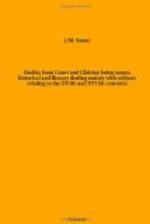“Whereas Sir Henry Bedingfeld of Oxburgh, Bart., being a recusant, and confined to the usual place of his abode, or within the compass of five miles from the same, and whereas it has been represented to us on the part of the said Sir Henry Bedingfeld that he has very necessary and urgent business, which does require his attention at this time, and whereas the said Sir Henry Bedingfeld has made an oath before us of the truth of the same, and that he will not make any causeless stay from his said place of habitation, we therefore, four of his Majesty’s Justices of the Peace for the said county upon examination taken by us as of the premisses, do give this our licence to the said Sir Henry Bedingfeld to travel out of the precincts or compass of five miles from the place of his abode limited by the statute at all times, from the 13 of this instant August, until the thirteenth of September following, by which time he is to return again to his place of abode at the parish of Oxburgh, aforesaid. Given under our hand and seal this Loth of August 1713.” Signed in the margin, “E. Bacon, T. De Grey, Tho. Wright, Nath. Life, H. Partridge, Dep. Lieut. I do assent to this licence.”
Sir Henry Bedingfeld succumbed to his infirmities in 1583, and was buried in the Bedingfeld chapel in Oxburgh church, where an elaborate monument to his memory may still be seen. It is to be regretted that the loss of the Privy Council Registers for the year 1583 entails also the loss of any mention of the last days of this celebrated Englishman.
IV. THE CATHOLIC REFORMATION IN GERMANY
In spite of the valiant efforts of isolated Catholic reformers in Germany, to stem the tide of corruption which threatened to sweep the Church into a vortex of ruin, for a long time little impression was made on the vast sea of abuses, and but little permanent good was effected. It almost seemed as though the Poor Clares of Nuremburg, the brave Dominicanesses of Strassburg, Johannes Busch, Johannes Geiler, Cardinal Nicholas of Cusa, St. John Capistran, the Brethren of the Common Life, and the celebrated author of the Imitation of Christ had lived and fought, suffered and preached, in vain. They, and some few others were like brilliant meteors, only making the darkness of the night more apparent.
The nations were as little responsive to preachers of reform as were the princes of Europe to the appeals of the Pope for a crusade against the infidel Turk, who menaced, after his conquest of Constantinople, the very centre of Christendom. While the citadel was in danger, those who should have assembled vast cohorts in its defence were either suffering from the inertia that follows on some kinds of disease, or were actively employed in spreading the new heresies. Then at last struck the hour for the dawning of a new day. And here perhaps lies the solution to the problem why so much energy, self-denial, penance




